Ethical Challenges Faced by Recruitment Officers: A Detailed Analysis
VerifiedAdded on 2022/08/10
|8
|1918
|20
Essay
AI Summary
This essay delves into the ethical responsibilities of a recruitment officer, particularly focusing on scenarios where personal relationships, like a cousin applying for a job, create potential conflicts of interest. It emphasizes the importance of honesty, fairness, and loyalty to the company, advocating for transparency and equal opportunity for all candidates. The essay explores how recruitment officers can avoid nepotism, maintain professional excellence, and uphold ethical standards by treating all applicants with respect and integrity. It highlights the significance of not disclosing confidential information and avoiding any form of corruption, stressing the need to base hiring decisions on qualifications and potential, not personal relationships. The conclusion underscores the critical role of ethics in recruitment, advocating for justice and fairness in the selection process to ensure the best-qualified candidate is chosen for the role.
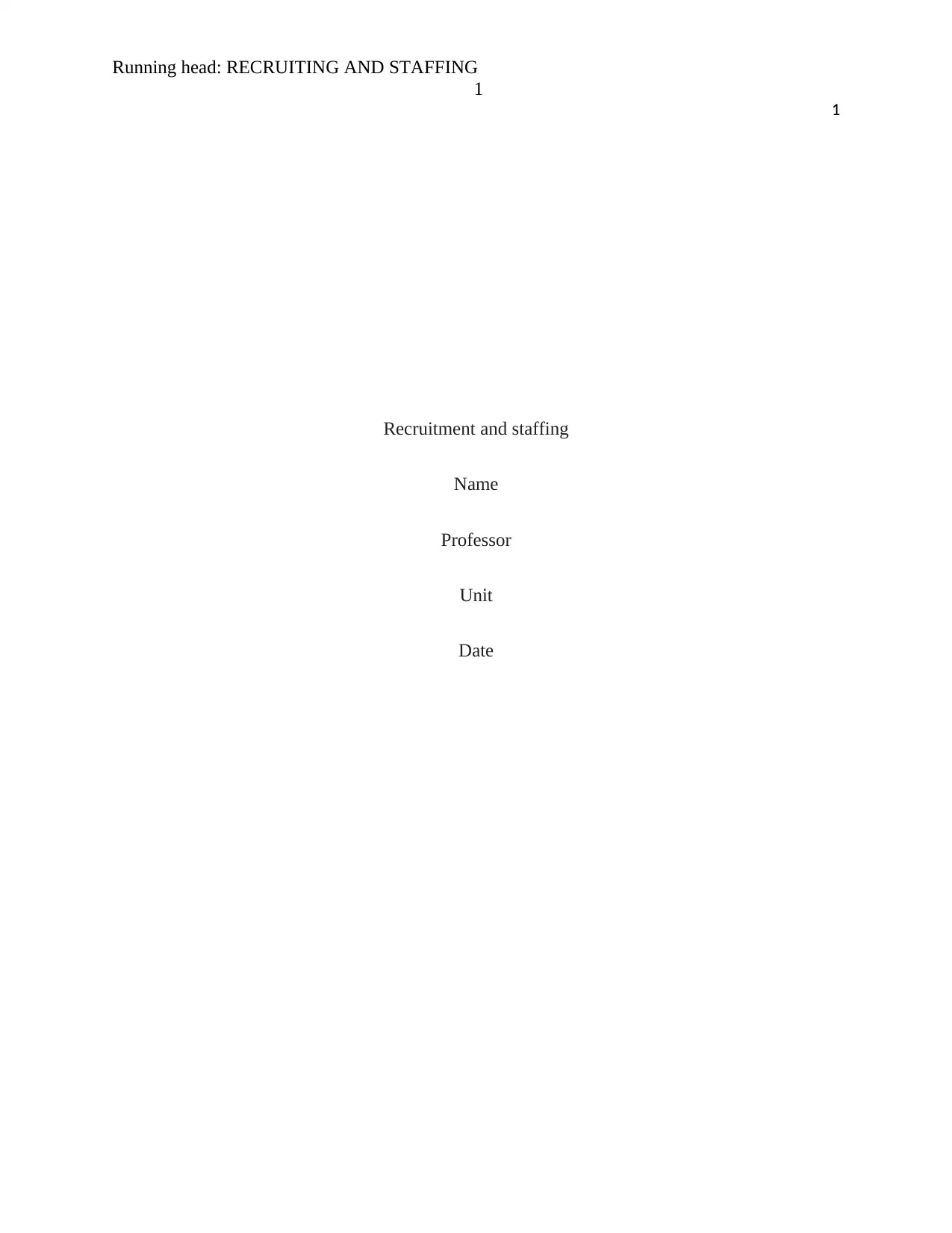
Running head: RECRUITING AND STAFFING
1
1
Recruitment and staffing
Name
Professor
Unit
Date
1
1
Recruitment and staffing
Name
Professor
Unit
Date
Paraphrase This Document
Need a fresh take? Get an instant paraphrase of this document with our AI Paraphraser
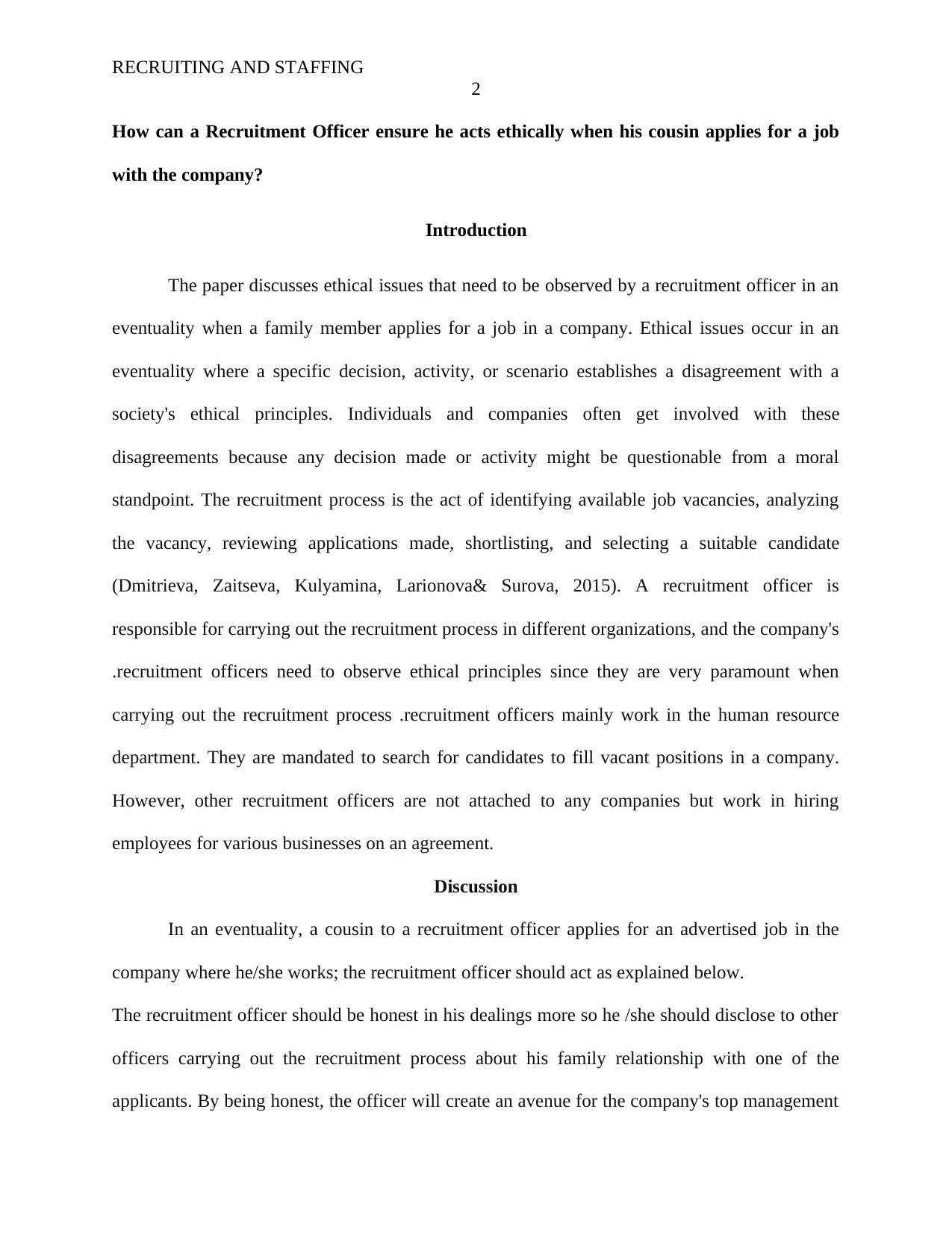
RECRUITING AND STAFFING
2
How can a Recruitment Officer ensure he acts ethically when his cousin applies for a job
with the company?
Introduction
The paper discusses ethical issues that need to be observed by a recruitment officer in an
eventuality when a family member applies for a job in a company. Ethical issues occur in an
eventuality where a specific decision, activity, or scenario establishes a disagreement with a
society's ethical principles. Individuals and companies often get involved with these
disagreements because any decision made or activity might be questionable from a moral
standpoint. The recruitment process is the act of identifying available job vacancies, analyzing
the vacancy, reviewing applications made, shortlisting, and selecting a suitable candidate
(Dmitrieva, Zaitseva, Kulyamina, Larionova& Surova, 2015). A recruitment officer is
responsible for carrying out the recruitment process in different organizations, and the company's
.recruitment officers need to observe ethical principles since they are very paramount when
carrying out the recruitment process .recruitment officers mainly work in the human resource
department. They are mandated to search for candidates to fill vacant positions in a company.
However, other recruitment officers are not attached to any companies but work in hiring
employees for various businesses on an agreement.
Discussion
In an eventuality, a cousin to a recruitment officer applies for an advertised job in the
company where he/she works; the recruitment officer should act as explained below.
The recruitment officer should be honest in his dealings more so he /she should disclose to other
officers carrying out the recruitment process about his family relationship with one of the
applicants. By being honest, the officer will create an avenue for the company's top management
2
How can a Recruitment Officer ensure he acts ethically when his cousin applies for a job
with the company?
Introduction
The paper discusses ethical issues that need to be observed by a recruitment officer in an
eventuality when a family member applies for a job in a company. Ethical issues occur in an
eventuality where a specific decision, activity, or scenario establishes a disagreement with a
society's ethical principles. Individuals and companies often get involved with these
disagreements because any decision made or activity might be questionable from a moral
standpoint. The recruitment process is the act of identifying available job vacancies, analyzing
the vacancy, reviewing applications made, shortlisting, and selecting a suitable candidate
(Dmitrieva, Zaitseva, Kulyamina, Larionova& Surova, 2015). A recruitment officer is
responsible for carrying out the recruitment process in different organizations, and the company's
.recruitment officers need to observe ethical principles since they are very paramount when
carrying out the recruitment process .recruitment officers mainly work in the human resource
department. They are mandated to search for candidates to fill vacant positions in a company.
However, other recruitment officers are not attached to any companies but work in hiring
employees for various businesses on an agreement.
Discussion
In an eventuality, a cousin to a recruitment officer applies for an advertised job in the
company where he/she works; the recruitment officer should act as explained below.
The recruitment officer should be honest in his dealings more so he /she should disclose to other
officers carrying out the recruitment process about his family relationship with one of the
applicants. By being honest, the officer will create an avenue for the company's top management
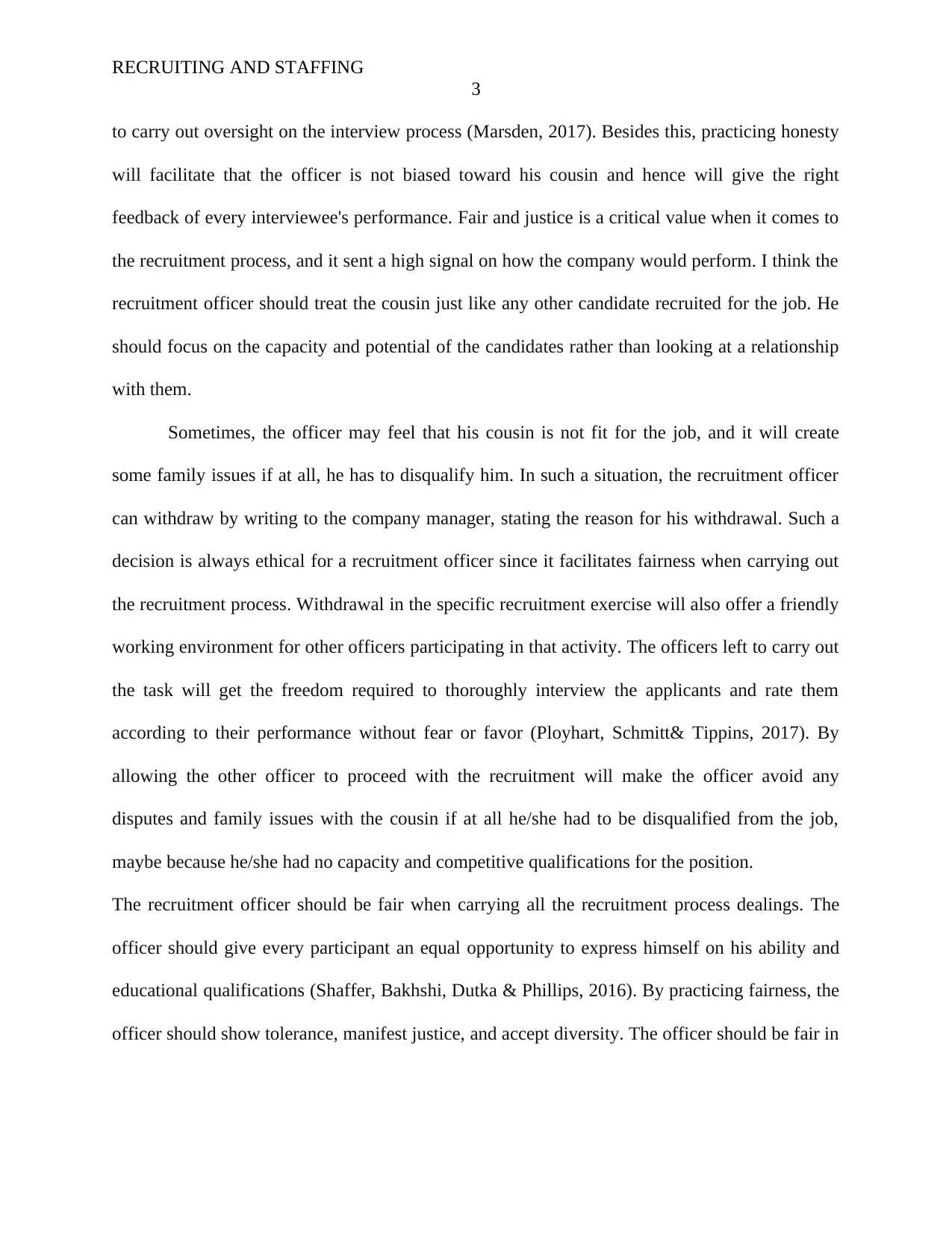
RECRUITING AND STAFFING
3
to carry out oversight on the interview process (Marsden, 2017). Besides this, practicing honesty
will facilitate that the officer is not biased toward his cousin and hence will give the right
feedback of every interviewee's performance. Fair and justice is a critical value when it comes to
the recruitment process, and it sent a high signal on how the company would perform. I think the
recruitment officer should treat the cousin just like any other candidate recruited for the job. He
should focus on the capacity and potential of the candidates rather than looking at a relationship
with them.
Sometimes, the officer may feel that his cousin is not fit for the job, and it will create
some family issues if at all, he has to disqualify him. In such a situation, the recruitment officer
can withdraw by writing to the company manager, stating the reason for his withdrawal. Such a
decision is always ethical for a recruitment officer since it facilitates fairness when carrying out
the recruitment process. Withdrawal in the specific recruitment exercise will also offer a friendly
working environment for other officers participating in that activity. The officers left to carry out
the task will get the freedom required to thoroughly interview the applicants and rate them
according to their performance without fear or favor (Ployhart, Schmitt& Tippins, 2017). By
allowing the other officer to proceed with the recruitment will make the officer avoid any
disputes and family issues with the cousin if at all he/she had to be disqualified from the job,
maybe because he/she had no capacity and competitive qualifications for the position.
The recruitment officer should be fair when carrying all the recruitment process dealings. The
officer should give every participant an equal opportunity to express himself on his ability and
educational qualifications (Shaffer, Bakhshi, Dutka & Phillips, 2016). By practicing fairness, the
officer should show tolerance, manifest justice, and accept diversity. The officer should be fair in
3
to carry out oversight on the interview process (Marsden, 2017). Besides this, practicing honesty
will facilitate that the officer is not biased toward his cousin and hence will give the right
feedback of every interviewee's performance. Fair and justice is a critical value when it comes to
the recruitment process, and it sent a high signal on how the company would perform. I think the
recruitment officer should treat the cousin just like any other candidate recruited for the job. He
should focus on the capacity and potential of the candidates rather than looking at a relationship
with them.
Sometimes, the officer may feel that his cousin is not fit for the job, and it will create
some family issues if at all, he has to disqualify him. In such a situation, the recruitment officer
can withdraw by writing to the company manager, stating the reason for his withdrawal. Such a
decision is always ethical for a recruitment officer since it facilitates fairness when carrying out
the recruitment process. Withdrawal in the specific recruitment exercise will also offer a friendly
working environment for other officers participating in that activity. The officers left to carry out
the task will get the freedom required to thoroughly interview the applicants and rate them
according to their performance without fear or favor (Ployhart, Schmitt& Tippins, 2017). By
allowing the other officer to proceed with the recruitment will make the officer avoid any
disputes and family issues with the cousin if at all he/she had to be disqualified from the job,
maybe because he/she had no capacity and competitive qualifications for the position.
The recruitment officer should be fair when carrying all the recruitment process dealings. The
officer should give every participant an equal opportunity to express himself on his ability and
educational qualifications (Shaffer, Bakhshi, Dutka & Phillips, 2016). By practicing fairness, the
officer should show tolerance, manifest justice, and accept diversity. The officer should be fair in
⊘ This is a preview!⊘
Do you want full access?
Subscribe today to unlock all pages.

Trusted by 1+ million students worldwide
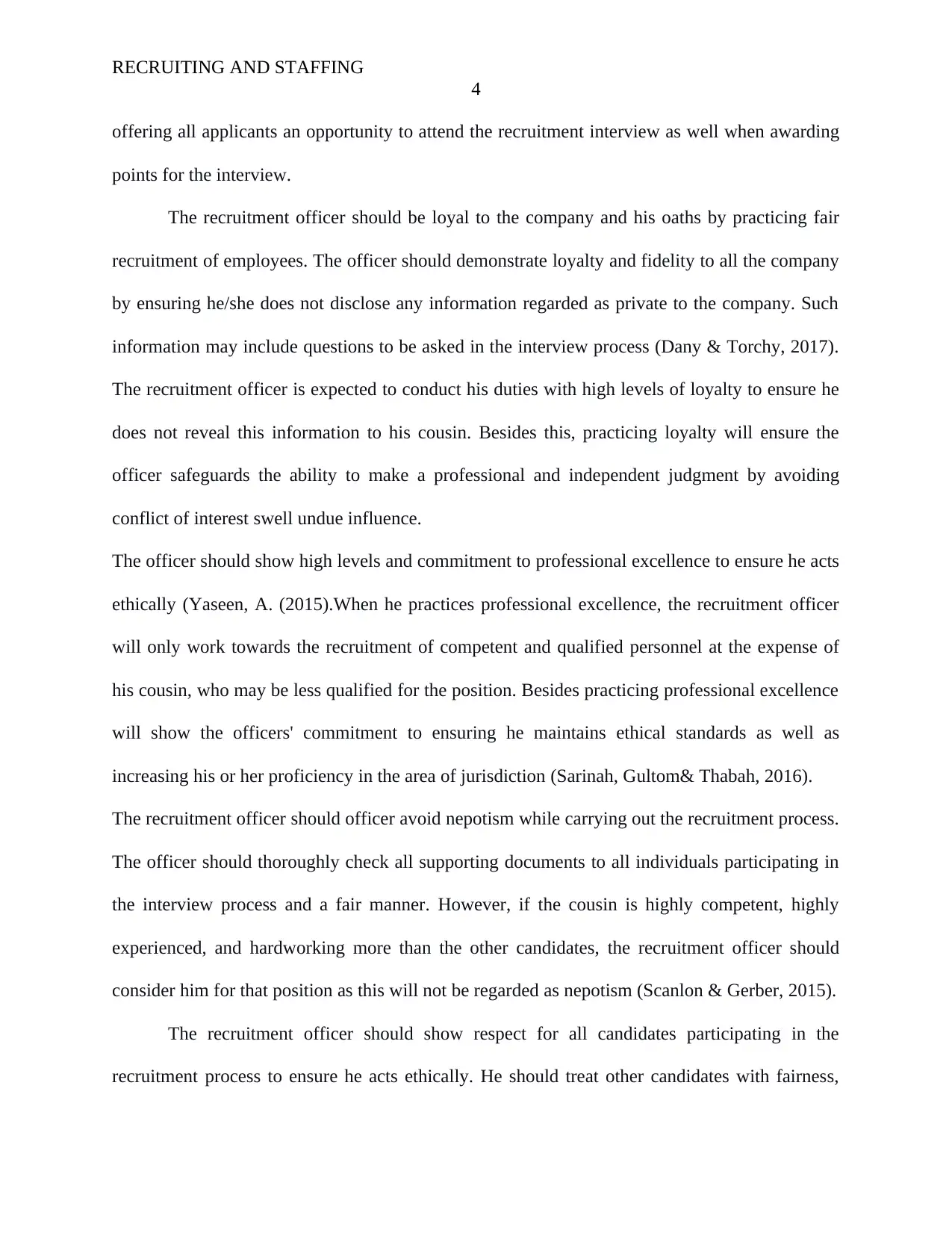
RECRUITING AND STAFFING
4
offering all applicants an opportunity to attend the recruitment interview as well when awarding
points for the interview.
The recruitment officer should be loyal to the company and his oaths by practicing fair
recruitment of employees. The officer should demonstrate loyalty and fidelity to all the company
by ensuring he/she does not disclose any information regarded as private to the company. Such
information may include questions to be asked in the interview process (Dany & Torchy, 2017).
The recruitment officer is expected to conduct his duties with high levels of loyalty to ensure he
does not reveal this information to his cousin. Besides this, practicing loyalty will ensure the
officer safeguards the ability to make a professional and independent judgment by avoiding
conflict of interest swell undue influence.
The officer should show high levels and commitment to professional excellence to ensure he acts
ethically (Yaseen, A. (2015).When he practices professional excellence, the recruitment officer
will only work towards the recruitment of competent and qualified personnel at the expense of
his cousin, who may be less qualified for the position. Besides practicing professional excellence
will show the officers' commitment to ensuring he maintains ethical standards as well as
increasing his or her proficiency in the area of jurisdiction (Sarinah, Gultom& Thabah, 2016).
The recruitment officer should officer avoid nepotism while carrying out the recruitment process.
The officer should thoroughly check all supporting documents to all individuals participating in
the interview process and a fair manner. However, if the cousin is highly competent, highly
experienced, and hardworking more than the other candidates, the recruitment officer should
consider him for that position as this will not be regarded as nepotism (Scanlon & Gerber, 2015).
The recruitment officer should show respect for all candidates participating in the
recruitment process to ensure he acts ethically. He should treat other candidates with fairness,
4
offering all applicants an opportunity to attend the recruitment interview as well when awarding
points for the interview.
The recruitment officer should be loyal to the company and his oaths by practicing fair
recruitment of employees. The officer should demonstrate loyalty and fidelity to all the company
by ensuring he/she does not disclose any information regarded as private to the company. Such
information may include questions to be asked in the interview process (Dany & Torchy, 2017).
The recruitment officer is expected to conduct his duties with high levels of loyalty to ensure he
does not reveal this information to his cousin. Besides this, practicing loyalty will ensure the
officer safeguards the ability to make a professional and independent judgment by avoiding
conflict of interest swell undue influence.
The officer should show high levels and commitment to professional excellence to ensure he acts
ethically (Yaseen, A. (2015).When he practices professional excellence, the recruitment officer
will only work towards the recruitment of competent and qualified personnel at the expense of
his cousin, who may be less qualified for the position. Besides practicing professional excellence
will show the officers' commitment to ensuring he maintains ethical standards as well as
increasing his or her proficiency in the area of jurisdiction (Sarinah, Gultom& Thabah, 2016).
The recruitment officer should officer avoid nepotism while carrying out the recruitment process.
The officer should thoroughly check all supporting documents to all individuals participating in
the interview process and a fair manner. However, if the cousin is highly competent, highly
experienced, and hardworking more than the other candidates, the recruitment officer should
consider him for that position as this will not be regarded as nepotism (Scanlon & Gerber, 2015).
The recruitment officer should show respect for all candidates participating in the
recruitment process to ensure he acts ethically. He should treat other candidates with fairness,
Paraphrase This Document
Need a fresh take? Get an instant paraphrase of this document with our AI Paraphraser
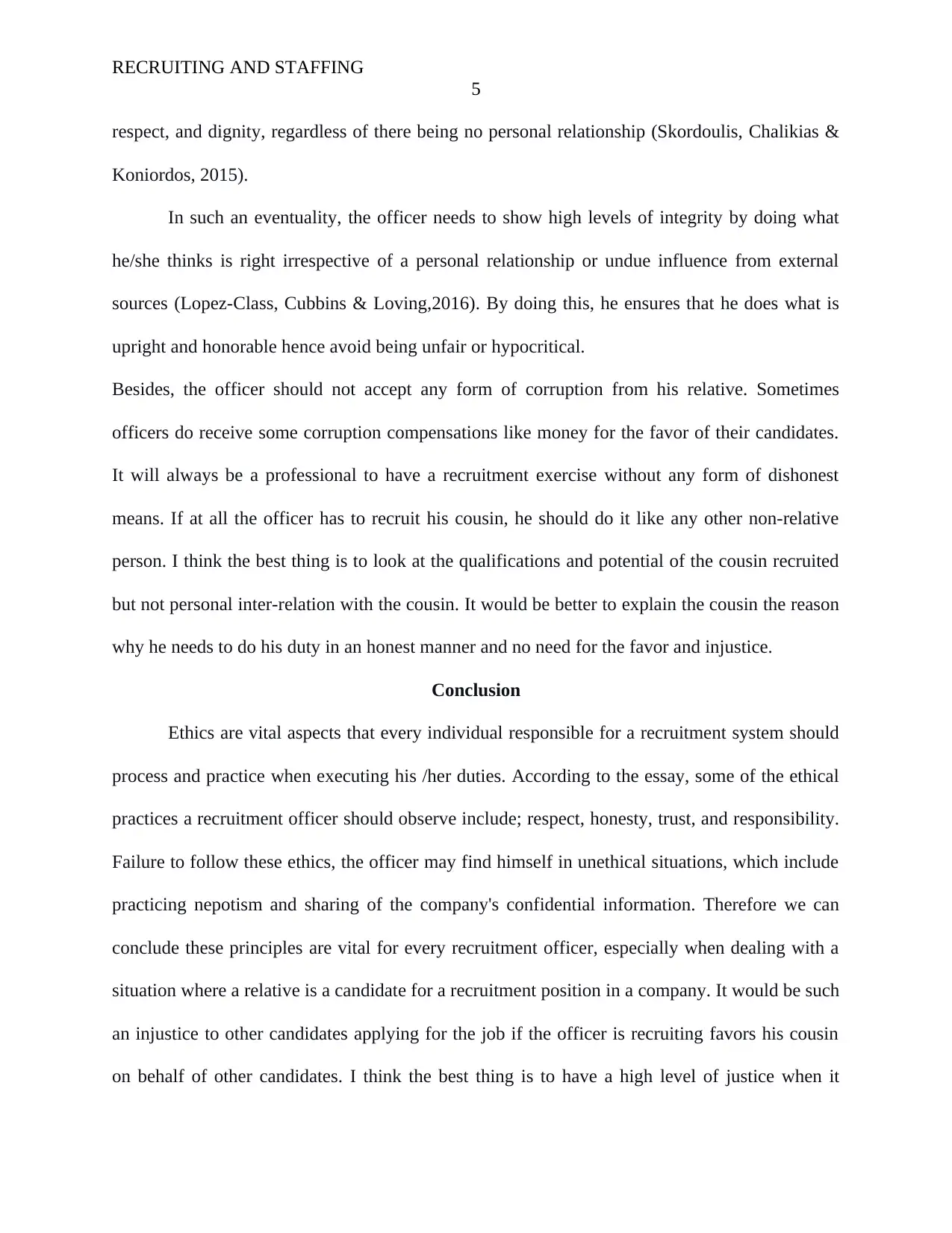
RECRUITING AND STAFFING
5
respect, and dignity, regardless of there being no personal relationship (Skordoulis, Chalikias &
Koniordos, 2015).
In such an eventuality, the officer needs to show high levels of integrity by doing what
he/she thinks is right irrespective of a personal relationship or undue influence from external
sources (Lopez-Class, Cubbins & Loving,2016). By doing this, he ensures that he does what is
upright and honorable hence avoid being unfair or hypocritical.
Besides, the officer should not accept any form of corruption from his relative. Sometimes
officers do receive some corruption compensations like money for the favor of their candidates.
It will always be a professional to have a recruitment exercise without any form of dishonest
means. If at all the officer has to recruit his cousin, he should do it like any other non-relative
person. I think the best thing is to look at the qualifications and potential of the cousin recruited
but not personal inter-relation with the cousin. It would be better to explain the cousin the reason
why he needs to do his duty in an honest manner and no need for the favor and injustice.
Conclusion
Ethics are vital aspects that every individual responsible for a recruitment system should
process and practice when executing his /her duties. According to the essay, some of the ethical
practices a recruitment officer should observe include; respect, honesty, trust, and responsibility.
Failure to follow these ethics, the officer may find himself in unethical situations, which include
practicing nepotism and sharing of the company's confidential information. Therefore we can
conclude these principles are vital for every recruitment officer, especially when dealing with a
situation where a relative is a candidate for a recruitment position in a company. It would be such
an injustice to other candidates applying for the job if the officer is recruiting favors his cousin
on behalf of other candidates. I think the best thing is to have a high level of justice when it
5
respect, and dignity, regardless of there being no personal relationship (Skordoulis, Chalikias &
Koniordos, 2015).
In such an eventuality, the officer needs to show high levels of integrity by doing what
he/she thinks is right irrespective of a personal relationship or undue influence from external
sources (Lopez-Class, Cubbins & Loving,2016). By doing this, he ensures that he does what is
upright and honorable hence avoid being unfair or hypocritical.
Besides, the officer should not accept any form of corruption from his relative. Sometimes
officers do receive some corruption compensations like money for the favor of their candidates.
It will always be a professional to have a recruitment exercise without any form of dishonest
means. If at all the officer has to recruit his cousin, he should do it like any other non-relative
person. I think the best thing is to look at the qualifications and potential of the cousin recruited
but not personal inter-relation with the cousin. It would be better to explain the cousin the reason
why he needs to do his duty in an honest manner and no need for the favor and injustice.
Conclusion
Ethics are vital aspects that every individual responsible for a recruitment system should
process and practice when executing his /her duties. According to the essay, some of the ethical
practices a recruitment officer should observe include; respect, honesty, trust, and responsibility.
Failure to follow these ethics, the officer may find himself in unethical situations, which include
practicing nepotism and sharing of the company's confidential information. Therefore we can
conclude these principles are vital for every recruitment officer, especially when dealing with a
situation where a relative is a candidate for a recruitment position in a company. It would be such
an injustice to other candidates applying for the job if the officer is recruiting favors his cousin
on behalf of other candidates. I think the best thing is to have a high level of justice when it

RECRUITING AND STAFFING
6
comes to matters related to recruitment and employment in the company. The company needs the
person who is fit and capable of performing the duty and activity allocated. This would be
achieved if, at all, the officer uses justice and fairness in the recruitment process because the
right candidate would be chosen without favor.
6
comes to matters related to recruitment and employment in the company. The company needs the
person who is fit and capable of performing the duty and activity allocated. This would be
achieved if, at all, the officer uses justice and fairness in the recruitment process because the
right candidate would be chosen without favor.
⊘ This is a preview!⊘
Do you want full access?
Subscribe today to unlock all pages.

Trusted by 1+ million students worldwide
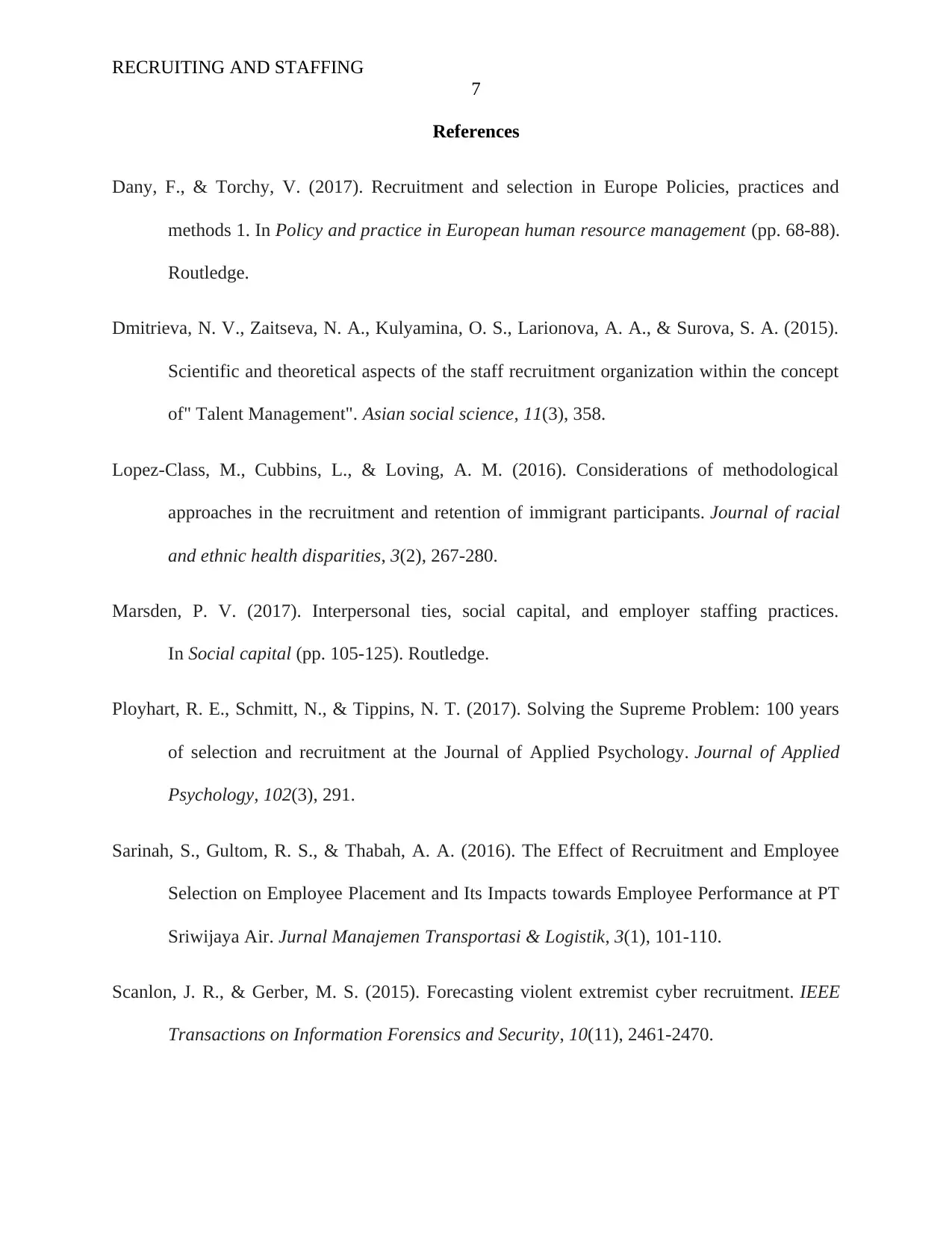
RECRUITING AND STAFFING
7
References
Dany, F., & Torchy, V. (2017). Recruitment and selection in Europe Policies, practices and
methods 1. In Policy and practice in European human resource management (pp. 68-88).
Routledge.
Dmitrieva, N. V., Zaitseva, N. A., Kulyamina, O. S., Larionova, A. A., & Surova, S. A. (2015).
Scientific and theoretical aspects of the staff recruitment organization within the concept
of" Talent Management". Asian social science, 11(3), 358.
Lopez-Class, M., Cubbins, L., & Loving, A. M. (2016). Considerations of methodological
approaches in the recruitment and retention of immigrant participants. Journal of racial
and ethnic health disparities, 3(2), 267-280.
Marsden, P. V. (2017). Interpersonal ties, social capital, and employer staffing practices.
In Social capital (pp. 105-125). Routledge.
Ployhart, R. E., Schmitt, N., & Tippins, N. T. (2017). Solving the Supreme Problem: 100 years
of selection and recruitment at the Journal of Applied Psychology. Journal of Applied
Psychology, 102(3), 291.
Sarinah, S., Gultom, R. S., & Thabah, A. A. (2016). The Effect of Recruitment and Employee
Selection on Employee Placement and Its Impacts towards Employee Performance at PT
Sriwijaya Air. Jurnal Manajemen Transportasi & Logistik, 3(1), 101-110.
Scanlon, J. R., & Gerber, M. S. (2015). Forecasting violent extremist cyber recruitment. IEEE
Transactions on Information Forensics and Security, 10(11), 2461-2470.
7
References
Dany, F., & Torchy, V. (2017). Recruitment and selection in Europe Policies, practices and
methods 1. In Policy and practice in European human resource management (pp. 68-88).
Routledge.
Dmitrieva, N. V., Zaitseva, N. A., Kulyamina, O. S., Larionova, A. A., & Surova, S. A. (2015).
Scientific and theoretical aspects of the staff recruitment organization within the concept
of" Talent Management". Asian social science, 11(3), 358.
Lopez-Class, M., Cubbins, L., & Loving, A. M. (2016). Considerations of methodological
approaches in the recruitment and retention of immigrant participants. Journal of racial
and ethnic health disparities, 3(2), 267-280.
Marsden, P. V. (2017). Interpersonal ties, social capital, and employer staffing practices.
In Social capital (pp. 105-125). Routledge.
Ployhart, R. E., Schmitt, N., & Tippins, N. T. (2017). Solving the Supreme Problem: 100 years
of selection and recruitment at the Journal of Applied Psychology. Journal of Applied
Psychology, 102(3), 291.
Sarinah, S., Gultom, R. S., & Thabah, A. A. (2016). The Effect of Recruitment and Employee
Selection on Employee Placement and Its Impacts towards Employee Performance at PT
Sriwijaya Air. Jurnal Manajemen Transportasi & Logistik, 3(1), 101-110.
Scanlon, J. R., & Gerber, M. S. (2015). Forecasting violent extremist cyber recruitment. IEEE
Transactions on Information Forensics and Security, 10(11), 2461-2470.
Paraphrase This Document
Need a fresh take? Get an instant paraphrase of this document with our AI Paraphraser
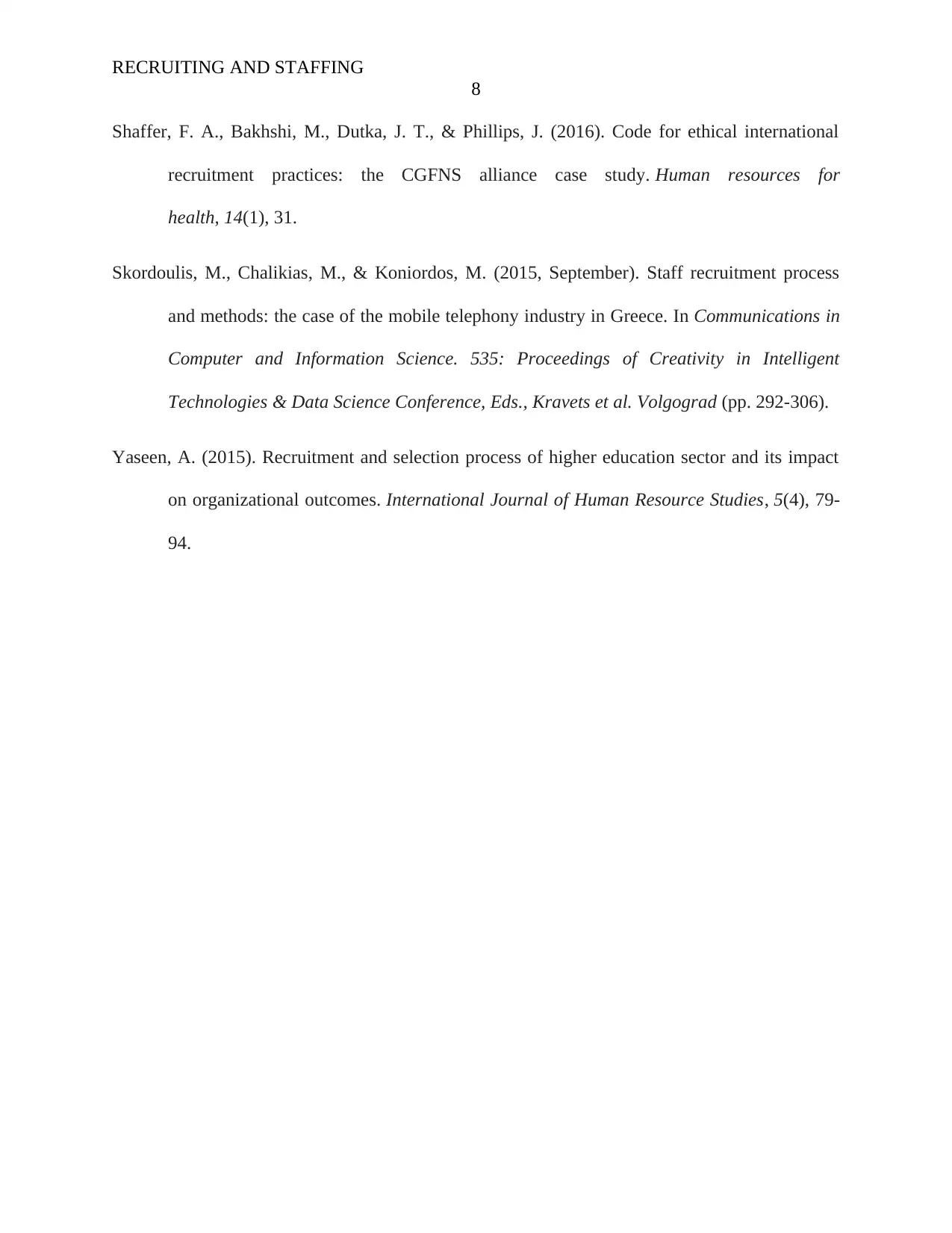
RECRUITING AND STAFFING
8
Shaffer, F. A., Bakhshi, M., Dutka, J. T., & Phillips, J. (2016). Code for ethical international
recruitment practices: the CGFNS alliance case study. Human resources for
health, 14(1), 31.
Skordoulis, M., Chalikias, M., & Koniordos, M. (2015, September). Staff recruitment process
and methods: the case of the mobile telephony industry in Greece. In Communications in
Computer and Information Science. 535: Proceedings of Creativity in Intelligent
Technologies & Data Science Conference, Eds., Kravets et al. Volgograd (pp. 292-306).
Yaseen, A. (2015). Recruitment and selection process of higher education sector and its impact
on organizational outcomes. International Journal of Human Resource Studies, 5(4), 79-
94.
8
Shaffer, F. A., Bakhshi, M., Dutka, J. T., & Phillips, J. (2016). Code for ethical international
recruitment practices: the CGFNS alliance case study. Human resources for
health, 14(1), 31.
Skordoulis, M., Chalikias, M., & Koniordos, M. (2015, September). Staff recruitment process
and methods: the case of the mobile telephony industry in Greece. In Communications in
Computer and Information Science. 535: Proceedings of Creativity in Intelligent
Technologies & Data Science Conference, Eds., Kravets et al. Volgograd (pp. 292-306).
Yaseen, A. (2015). Recruitment and selection process of higher education sector and its impact
on organizational outcomes. International Journal of Human Resource Studies, 5(4), 79-
94.
1 out of 8
Related Documents
Your All-in-One AI-Powered Toolkit for Academic Success.
+13062052269
info@desklib.com
Available 24*7 on WhatsApp / Email
![[object Object]](/_next/static/media/star-bottom.7253800d.svg)
Unlock your academic potential
Copyright © 2020–2026 A2Z Services. All Rights Reserved. Developed and managed by ZUCOL.





